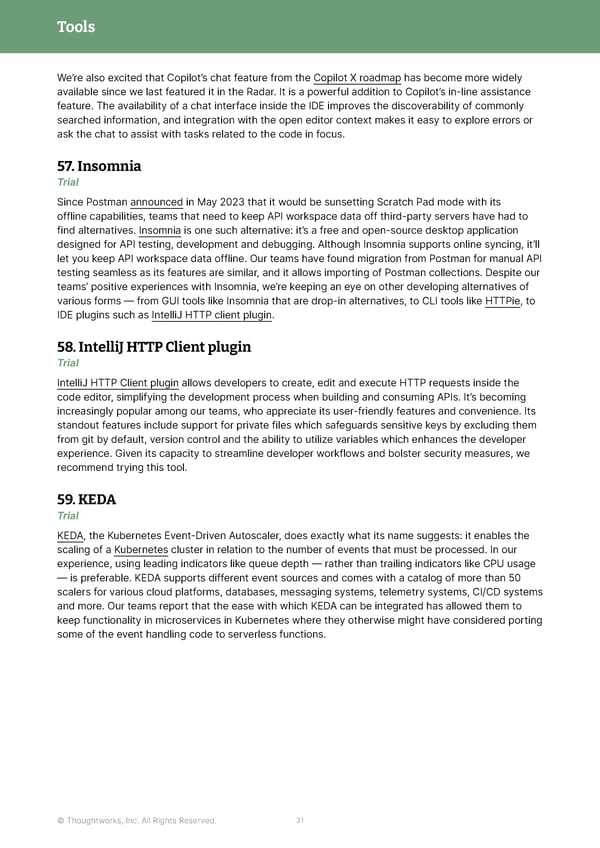Tools We’re also excited that Copilot’s chat feature from the Copilot X roadmap has become more widely available since we last featured it in the Radar. It is a powerful addition to Copilot’s in-line assistance feature. The availability of a chat interface inside the IDE improves the discoverability of commonly searched information, and integration with the open editor context makes it easy to explore errors or ask the chat to assist with tasks related to the code in focus. 57. Insomnia Trial Since Postman announced in May 2023 that it would be sunsetting Scratch Pad mode with its offline capabilities, teams that need to keep API workspace data off third-party servers have had to find alternatives. Insomnia is one such alternative: it’s a free and open-source desktop application designed for API testing, development and debugging. Although Insomnia supports online syncing, it’ll let you keep API workspace data offline. Our teams have found migration from Postman for manual API testing seamless as its features are similar, and it allows importing of Postman collections. Despite our teams’ positive experiences with Insomnia, we’re keeping an eye on other developing alternatives of various forms — from GUI tools like Insomnia that are drop-in alternatives, to CLI tools like HTTPie, to IDE plugins such as IntelliJ HTTP client plugin. 58. IntelliJ HTTP Client plugin Trial IntelliJ HTTP Client plugin allows developers to create, edit and execute HTTP requests inside the code editor, simplifying the development process when building and consuming APIs. It’s becoming increasingly popular among our teams, who appreciate its user-friendly features and convenience. Its standout features include support for private files which safeguards sensitive keys by excluding them from git by default, version control and the ability to utilize variables which enhances the developer experience. Given its capacity to streamline developer workflows and bolster security measures, we recommend trying this tool. 59. KEDA Trial KEDA, the Kubernetes Event-Driven Autoscaler, does exactly what its name suggests: it enables the scaling of a Kubernetes cluster in relation to the number of events that must be processed. In our experience, using leading indicators like queue depth — rather than trailing indicators like CPU usage — is preferable. KEDA supports different event sources and comes with a catalog of more than 50 scalers for various cloud platforms, databases, messaging systems, telemetry systems, CI/CD systems and more. Our teams report that the ease with which KEDA can be integrated has allowed them to keep functionality in microservices in Kubernetes where they otherwise might have considered porting some of the event handling code to serverless functions. © Thoughtworks, Inc. All Rights Reserved. 31
 Thoughtworks Technology Radar Page 30 Page 32
Thoughtworks Technology Radar Page 30 Page 32